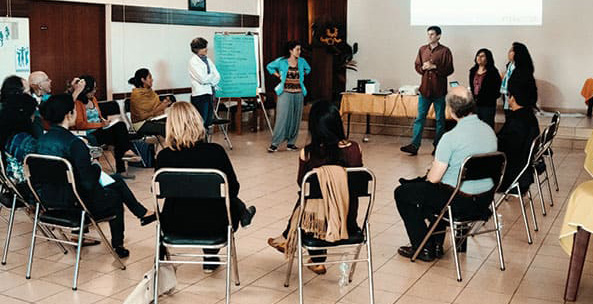“The centurion... said, ‘This man was innocent beyond doubt.’” - Luke 23: 47
In the Gospel for Palm Sunday, we hear the story of Jesus’ betrayal, arrest, trial and death on the Cross.
In the liturgy, as members of the community read various parts in the Passion narrative, we are reminded that Jesus’ Passion is ongoing today in the suffering of people around the world. Through our sins, we all contribute to this suffering -- we can identify with Peter, the denier; Judas, the betrayer; Pilate, who turned his attention away; and the frantic crowd.
On this holy day we also recall that in our experience of suffering we are connected to Christ. Jesus, God himself, was debased, reviled, and mocked in the hands of prison guards. His dignity as a person – and, in an incomprehensible way, as God – was denied but not diminished. In the image of Christ on the cross we are reminded of the great dignity of all human life and especially those who suffer and are persecuted.
In meditating on the abuse Jesus faced as a prisoner, we can reflect on the treatment of the incarcerated around the world and the call of Christians to extend mercy and seek reconciliation. Today, the dignity of prisoners is denied through systems that see them only for the crime they have committed, rather than as human persons in need of healing and rehabilitation.
The Compendium of Catholic Social Doctrine states that there is a “two-fold purpose” for a society’s justice system: “On the one hand, [the goal is] encouraging the re-insertion of the condemned person into society; on the other, fostering a justice that reconciles, a justice capable of restoring harmony in social relationships disrupted by the criminal act committed.”
Maryknoll lay missioner Joanne Blaney works to promote restorative justice practices in the penal system in Brazil.
“[Through my work at the Human Rights and Popular Education Center,] I participated in a project working with the staff and judges in ten State Central Court Houses throughout Brazil to train in Restorative Justice Practices, focusing on promoting a justice that is just for all and one that deals with the collective responsibility of institutions and the state in the structural injustices that lead to mass incarceration and violence.
Each of these ten tribunals now has a Restorative Justice Center that is working to stem the tide of the penal system and trying to restore people and relationships. We also accompany and train groups around Brazil in Community Restorative Justice with a focus on inclusion, respect for the dignity of each person and dialogical practices that strengthen community bonds and collective actions. “
Jesus, though innocent, suffered as a prisoner on his way to the cross. On this Palm Sunday, we can prepare for the joy of Easter by meditating on Jesus’ ultimate act of mercy. In seeing Christ in the prisoner, may we work to uphold the rights and dignity of all whom society has rejected.
Questions for Reflection
- Which figures do you identify with in the Passion narrative?
- How is God calling you to take up the work of reconciliation in your life and community?
Living Lent
Pray
“We are still a long way from the time when our
conscience can be certain of having done everything
possible to prevent crime and to control it
effectively so that it no longer does harm and,
at the same time, to offer to those who commit
crimes a way of redeeming themselves and making
a positive return to society. If all those in some
way involved in the problem tried to . . . develop
this line of thought, perhaps humanity as a whole
could take a great step forward in creating a more
serene and peaceful society.”
- (Pope John Paul II, July 9, 2000)
Lord, have mercy on us for our lack of commitment
to justice and mercy in our own relationships,
and in society as a whole.
Renew in those who work in the justice system
a zeal for those they encounter, and teach us all
to go beyond what justice requires and to extend
mercy to others.
Amen.
-From Missionhurst’s “Novena for the Incarcerated”
Fast
When facing a person with whom you are different in some way, put “love your neighbor” into practice by offering an act of kindness. Release your hostages today – forgive people you hold hostage to the past.
Faith in Action
In this 20th anniversary year of the opening of the Guantanamo Bay detention center, a site of torture of prisoners by the U.S. government, urge President Biden to take action to close the prison now.
Maryknoll Mission Experience

Maryknoll Father Juan Zúñiga operates a ministry in Bolivian prisons that helps inmates learn how to forgive, recognizing that, apart from the crime which they committed, they are each a person on an interior journey. The ESPERE program, which in Spanish stands for “Schools of Forgiveness and Reconciliation,” was initiated in response to the brutal and abusive atmosphere within the prisons.
“When we do not forgive, we are left with feelings of resentment, anger—negative feelings that affect our lives,” says Fr. Zúñiga. “ESPERE is a program that teaches the process of forgiveness. We teach how to recognize and then free ourselves from those negative feelings so that we no longer carry that burden. It is a great help for our brothers and sisters who are incarcerated.”
(Photo: An ESPERE training session)
Photo of cross with palms available on Unsplash: https://unsplash.com/photos/OZxaBI0jYwo
Photo of the ESPERE ministry courtesy of Maryknoll Magazine: https://bit.ly/33txuBK


